Welcome to a wild ride into “Necrocapitalism” – cutting observations by Greek scientist and author George Tsakraklides. Then more worrying news about methane: frozen under the deep sea around every continent, methane can melt, migrate and release closer to shore. We talk through this new discovery from Petroleum Geologist and Pro-Vice Chancellor of Newcastle University Richard Davies. It all wraps up with my short-take on French Situationalist Guy Debord and “Society of the Spectacle”. You are living in it.
All the creative images in this blog were created by our guest George Tsakraklides, as an artist using AI tools.
Listen to or download this Radio Ecoshock show in CD Quality (57 MB) or Lo-Fi (14 MB)
GREENHOUSE COURSE NEWS – free!
A bit of news: my full video course “Build a Geothermal Greenhouse in Your Backyard” is now available free for all Radio Ecoshock listeners. I recorded the whole process from bare ground through construction to tips from operating the greenhouse for three years. I tried for a very low energy, all-season greenhouse in Canada, through bitter cold and record heat. Search YouTube for: “ecoshock greenhouse playlist”.
=====================
NECROCAPITALISM – GEORGE TSAKRAKLIDES
May we intrude into your bubble? Is reality in crisis? It is time for George Tsakraklides and his new book “In The Grip Of Necrocapitalism”. George is a scientist and author. From somewhere outside the suicidal Matrix, George reports back from the dark finality of these times…
Listen to or download this interview with George Tsakraklides in CD Quality or Lo-Fi
CAPITALISM UNTIL IT KILLS

In it’s later stages, Capitalism kills almost everything it contacts, from creatures to sea beds to the atmospheric climate that supports us all. That is “necrocapitalism”. George’s book In The Grip of Necrocapitalism is partly based on his earlier book (2023) “The Unhappiness Machine”. In the machine of consumption, major corporations and even governments generate negative emotions in the population (anger, despair, fear etc.) – to promote profits and control. You see that in social media and certainly in mainstream news.
All this is built on a long evolution of closely connected living things. Other things are alive without us, living in a physical landscape also real. Early in George’s new book, we find a lyrical tribute to the only true sustainable system: life on Earth. In several places he attributes powers and intention to what he calls “The Earthnet of Things”. That is where we need to connect in a humble way to find our sustainable place in Gaia.
But we go the other way. George has a dark view of the future we are making. You may suspect this yourself: a kind of disease in a purposeful fog of distraction. I invited George to Radio Ecoshock because few people put this into words better. His writing reminds me of Guy Debord, and his 1967 book “The Society of the Spectacle” (introduced at the end of this show) – and maybe the fantastic 1971 Firesign Theatre audio play “I Think We’re All Bozos on This Bus”. George takes us to the Consumatron Theme Park. Who are these bodies with cyber-extensions?
WE CREATE ARTIFICIAL DISTANCE FROM THE DISASTERS
“Then ongoing destruction of the planet is nothing but a reality show we are observing from a safe distance live on our screens, sitting on our couches, without any conscious sense of the significance of what we are actually watching…” Tsakraklides considers “the absurd scenario [when] the climate crisis will be completely forgotten in the very near future. World war, starvation, power cuts, migration and death will become far more important than what caused them all: the man-made climate catastrophe.”
We are not mentally prepared for the coming crisis and will soon get caught up in the stress of immediate survival he says.
THE THING
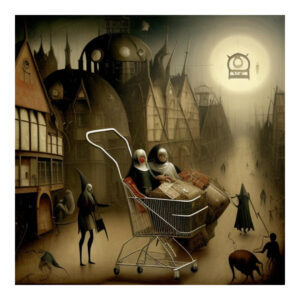
The profit-taking system of control is intentionally hidden and almost faceless. But like Karl Marx, George says people at the top are just as deluded as those at the bottom. Billionaires do not run this planet, they come and go, but the system of exploitation continues until extinction. The system doesn’t really have a name yet, so Tsakraklides call it “The Thing”, Could the Thing outlive it’s human host?
The only way to reform “the Thing” is to kill it. But the Thing is already suicidal, profiting from death. Can we kill it, before it kills us, and our current array of species?
You also need the word “psychonomy” – “An economic system which is heavily reliant upon the commercialization and exploitation of the mental disorders of both its workers and its end consumers. “…creating a civilization where all of these psychoses were not only considered normal, but would eventually become useful skills. They would become the bedrock of social and political organization. This would be a civilization where the most psychotic and unstable personalities were welcomed and, would in fact thrive and attain leadership positions. They would be the most successful individuals…” (quotes from “In the Grip of Necrocapitalism”)
The real answer says George is stark: degrowth. That is not happening now, but it could, and eventually as the world breaks down in a series of unsolvable crises, degrowth will be forced upon us. It is only a question of whether we can spin down the death cycle using intelligent planning, or by suffering. Tsakraklides says don’t expect the collapse soon. Necrocapitalism still has more of the planet to consume if it can.
Check out this paper on Degrowth, published December 2022 in Nature: “Degrowth can work – here’s how science can help” by Jason Hickel.
George says: don’t get hung up on what is going to happen. It is happening already, We are well into overshoot. We need University courses, with like Extinction Ecology 101 (as he describes a future university in his novel “A New Earth”).
The Thing “is by definition self-destructive”. Calling us “the first suicidal life form on earth” George moves from his essential Gaianism closer to the Medea Hypothesis (Peter Ward) for just our species. He predicts of our future:
“It will be a time of panic, migration, isolationism, fascism and self-preservation, rather than collective solutions.”
We both hope he is wrong, but that is how it looks at this time.
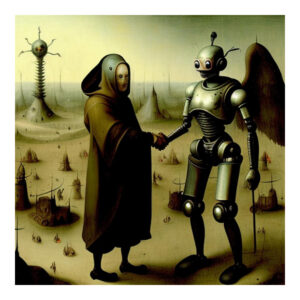
FINDING GEORGE
George Tsakraklides is a multi-platform communicator. His books, all available on Amazon, include The Unhappiness Machine: and other stories about Systemic Collapse (2023), A New Earth (a novella of a future), and Pocket Philosophy for End Times. His latest is “In The Grip Of Necrocapitalism”. Follow George on Twitter X under the handle @99blackbaloons. His excellent blog is tsakraklides.com.
CHECK OUT George’s latest article “A New Spiritual Geography: The Revenge of The Landfills”
A sample from G. Tsakraklides:
“In order to do this, one must achieve escape velocity from the narcissism and speciesism that form the foundation of the “human supremacy bubble” which tints much of human thought. If the author has done anything right, then hopefully much, if not all, of the content here will be listed under hopeless doomism, misanthropy and eco-fascism by those who have been indoctrinated in the bubble. These same individuals are more likely than others to also mistake the book’s candid introspection into human history and the human condition as personal insults. This reaction is to be expected.
The space outside of the bubble is cold, dark and lonely, and those who venture outside are already fully aware that they are not there to make friends. They are there to seek truth, and this is often assisted through science, as it is the approach that is more likely than others to rely on facts and events, rather than the evangelical narratives that the bubble has created over the millennia. The essays in this book [Necrocapitalism] aim to completely shatter the human supremacy bubble in one, loud blow, by juxtaposing biology with politics, ecology with economics, and physics with ethics. Are you ready? “
SEE ALSO: INTERVIEW W. LATE MICHAEL DOWD
George Tsakraklides: Post-doom with Michael Dowd
============================================
NEW METHANE FROM THE DEEP: RICHARD DAVIES
Huge amounts of the super warming gas methane lie frozen at the bottom of the sea. They are called “clathrates”. If they thaw and escape, a hothouse world results. New science finds even methane buried in the deep sea bed can get out.
The paper published October 2023 in Nature Geoscience is titled: “Long-distance migration and venting of methane from the base of the hydrate stability zone”. From Newcastle University, we are joined by the Pro-Vice Chancellor Global and Sustainability, and lead author of the study, Dr. Richard Davies.
Listen to or download this interview with Richard Davies in CD Quality or Lo-Fi
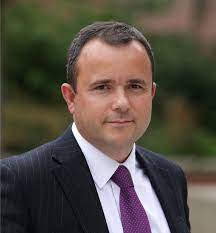
I found out about this science from Professor Davies article in The Conversation, December 8, 2023: “Frozen methane under the seabed is thawing as oceans warm – and things are worse than we thought”.
An amazing finding in this new study: methane can travel under the sea bed for long distances. This matters because a lot of methane (probably more than currently found in the atmosphere) is frozen along with ice deep in the ocean. These balls of frozen methane and water are called clathrates.
Previously scientists focused on clathrates only in depths where the bubbles of this super-warming greenhouse gas can reach the surface and the atmosphere. Deeper zones were not considered. This paper shows we need to look deeper.
As I understand it, methane in the deep sea bed is being released. Sea bed mapping (mostly paid for by oil and gas exploration) shows volcano-like structures on the deeper sea bed. Davies doesn’t think methane exploded there, but leaked out over long periods, swirling up other particles from the sea bed, leaving these structures.
Professor Davies only returned to this big stack of undersea mapping – after ten years – because he had time during the first stages of the COVID-19 pandemic. To his surprise, they showed methane can travel long distances through the loose layers of the sea bed. In places, it travels several kilometers toward shallower waters (where it is more likely to reach the atmosphere). But this can only happen where the long-time sea bed is uninterrupted by later seismic changes or events. So this mechanism will function in some regions, but not in others.
It sounds like all carbon budgets and plans to decarbonize might have to speed up, just to accommodate large unknowns in a looming methane release from the sea.
Canadian scientist/video-maker Paul Beckwith also covered this paper here.
==============================================
“THE SPECTACLE” – GUY DEBORD
“In societies where modern conditions of production prevail, all of life presents itself as an immense accumulation of spectacles. Everything that was directly lived has moved away into a representation.”
– Guy Debord
You must read the short work by French philospher Guy Debord. It is “The Society of the Spectacle”, being 221 short propositions about reality and unreality. You can read the whole thing, or bits at a time, for free here.
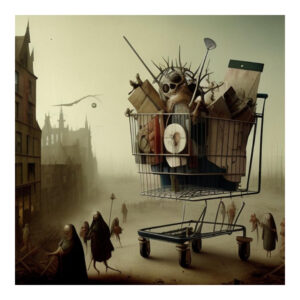
Image: George Tsakraklides
Listen to or download my 10 minute introduction to Guy Debord’s “Society of the Spectacle in CD Quality
TRANSCRIPT
(paid by Radio Ecoshock supporters)
Introduction to “The Spectacle” (Guy Debord) by Alex Smith
Speaker 2:
Right, I need some brave boys and girls who aren’t afraid to live outside the law of gravity. Families who like to sleep in tubes and push buttons, adventurers like you.
Speaker 3:
In view of the gravity of the situation, believing that radio has a responsibility to serve in the public interest at all times…
Alex Smith:
Are you worried about crazy events? Do you think you are alone out there? Perhaps the only sane one left?
“The specialization of images of the world is completed in the world of the autonomous image where the liar has lied to himself. The spectacle in general as the concrete inversion of life is the autonomous movement of the non-living.”
– Guy Debord.
Alex Smith:
We know now planet Earth cannot support 8 billion humans, all consuming resources and creating the pollution that kills off other life and possibly our own future. No dictator or hero can intervene to save us because those who benefit hold the ultimate weapons, the power of production and the voice of media. We play along with all of that.
“The spectacle grasp in its totality is both the result and the project of the existing mode of production. It is not a supplement to the real world, an additional decoration. It is the heart of the unrealism of the real society in all its specific forms, as information or propaganda, as advertisement or direct entertainment consumption, the spectacle is the present model of socially dominant life. It is the omnipresent affirmation of the choice already made in production and its corollary consumption.”
– Guy Debord.
Alex Smith:
The crux of change is identified by Marxist theorists like the French philosopher, Guy Debord. Our personal functions have been channeled to gather products which we use to build our unnatural identity. We are consumers. Some of us work to feed a specialized part to the machine, and that may be steel, or video, or user data. And are we feeling down or worried? New clothes or a new car will cheer us right up.
Speaker 7:
Consume, consume, consume until we have no planet left to consume. What you need to do is buy things that you don’t need. That’s the best way to support the economy. (Recorded at a UK action)
Alex Smith:
Guy Debord was born in 1931 and passed away in 1994. He wrote Philosophic works. He made movies and founded activist groups often based in his home of Paris. Today we glanced quickly at Guy’s inspirational work, the Society of the Spectacle published in 1967. The Paris Revolts of 1968 quickly followed, and Debord was among those who occupied the Sorbonne University. What is the spectacle? Here is an English translation from the film version of Society of the Spectacle.
“In societies dominated by modern conditions of production, life is presented as an immense accumulation of spectacles. Everything that was directly lived has receded into a representation. The images detached from every aspect of life merged into a common stream in which the unity of that life can no longer be recovered.
Fragmented views of reality regroup themselves into a new unity as a separate pseudo world that can only be looked at. The specialization of images of the world evolves into a world of autonomized images where even the deceivers are deceived.
The spectacle is a concrete inversion of life, an autonomous movement of the non-living. The spectacle presents itself simultaneously as society itself, as a part of society, and as a means of unification. As a part of society it is the focal point of all vision and all consciousness, but due to the very fact that this sector is separate, it is in reality the domain of delusion and false consciousness. The unification it achieves is nothing but an official language of universal separation.”
– Guy Debord
Alex Smith:
Debord was also a founder of an influential French art and culture criticism movement called the Situationists. Anyone contemplating activism should learn more about them.
In the Wikipedia entry for Situationists International, we find in Debord’s terms, Situationists defined the spectacle as an assemblage of social relations transmitted via the imagery of class power and as a period of capitalist development wherein, “All that was once lived has moved into representation.”
Alex says:
When the industrial revolution took flight in the 1830s, it was easy to see people’s lives were rapidly redefined, literally, to fit the needs of the machine. In the days before mass transportation, mill workers needed to live near the mill. They were moved, some forcibly others by a desire for wages, from their homes in the countryside into row housing in a town which became a complex city. It was not just a physical move.
The consciousness of the British lower class had to be trained to punctuality and detail in order to work with machines. Minds were reshaped to fit the needs of production. Later, Marxists developed that knowledge further. In a second stage, developing more in America in the 1930s, ideas from Henry Ford, Thomas Edison, and Frederick Winslow Taylor enabled mass production of merchandise. The public had to be educated as consumers, and that was the role of advertising. Debord might argue consumers were needed to fulfill the capability of production.
Drawing on Debord we might guess a key to programming human desires and ideas about ourselves is: the subject must never awake to a new state or revert to an old one. Either would break the chain of production and social power. A separate state of consciousness complimentary to the needs of production and tied to it has been created. It would replace the former direct experience of a lived environment by our natural selves, and replaces it with the spectacle.
These are not just circuses or a blockbuster movie everybody talks about and daydreams about. It is not just the media or social media. There is no single image for the spectacle because it is a pattern of social behaviors, allowing manufactured consciousness to replace the personhood innate to our species and possibly all species.
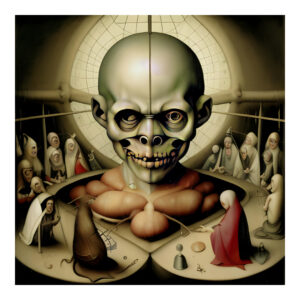
Image by George Tsakraklides
A BEAR STORY
Consider a modern human encountering a bear. The bear is not thinking about events on the other side of the planet and has never seen Seinfeld. The bear may have developed patterns of thought from parents or siblings, but we presume the bear is present to the immediate situation, which also contains a human, a strong stimulant. The human may at first be looking at an image in a phone, but looks up to see the bear and decides to record the encounter with the bear on the phone to post for friends later. Already this is an extended event, possibly reaching thousands of others, stimulating their mental images and social responses for a bear. The human may not actually see the particular bear who is present possibly with old wounds or distinctive ears. The human may be drawing on previously ingested images of bears, old news stories of killer bears, nursery rhymes of friendly childhood bears, all manner of things. Debord asks, how present are we really?
The false consciousness of consumerism, noted by many Marxist writers, has to be built on replicas of reality, and they’re never specifically true. In fact, the spectacle depends on our ability to lie to ourselves. This recognition of social falsehood helps explain the domination of denial in our world today.
“In a world which really is topsy-turvy, the truth is a moment of the false.”
– Guy Debord, Society of the Spectacle. 1967.
Alex Smith:
With more reading, we better understand how a majority of humans try to pretend a global pandemic, violent threats to democracy, and climate breakdown are not happening. You can find various versions of Guy Debord’s society of the Spectacle online, like here.
I’m Alex Smith. Thank you for listening to Radio Ecoshock this week, and thank you for caring about our world.
(The program ends with few final words – a dark reading from the late American counter-culture writer William S. Boroughs.)
You can help Radio Ecoshock keep going. Please make a one-time donation or become a monthly supporter.
I just happened upon your most excellent show via George’s Twitter posting of this interview. Thank you thank you thank you. I am in my late 60’s and my husband and I live in a very conservative area of the country and we feel so isolated in our views and our nonconsumptive habits. Listening to you and George is validating and confirms what we have sensed and known for decades. I will be listening and reading to you from here on. Our finances are bleak but should they improve I will make a donation! Sincerely, Anne Thacker
Hi Anne. Yes it can be isolating at times. Please do not send any money when you have other needs. I only ask for support from these comfortable to afford it. The other isolation of course comes from mass media. The purpose of mass media in the U.S. is to convince us we need things and buy them. They do that in adds, but they do it in “news” and entertainment shows. We see people on screens with nice cars, homes, expensive makeup and possibly Botox or surgery and we are supposed to believe that is the good life. We should live like that. Just think of the “news” about travel over major holidays, conditions in the airport, record millions in the air. Sometimes flights are interrupted by record storms all those plane emissions leave in the atmosphere, but we get the illusion that everyone is flying, everything is fine, go ahead and put that on your credit card… It doesn’t end well.